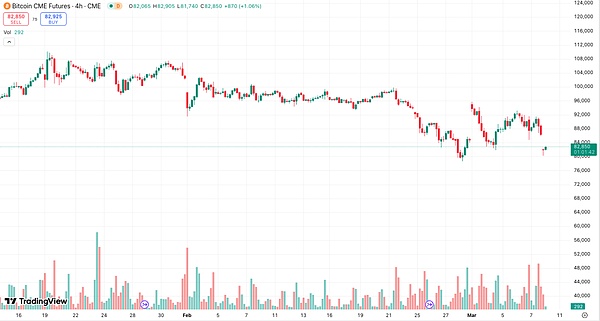Author: Techub News Written by: Babywhale, Techub News
This morning, Bitcoin hit the $80,000 mark again, and at the time of writing this article, it has rebounded to above $82,500. The weekend's decline also left a huge gap on CME's Bitcoin futures chart, just like last week.

According to Coinglass data, as of the time of writing, the entire network has been liquidated for about $621 million in the past 24 hours. Among them, Bitcoin contracts have been liquidated for about $240 million, Ethereum contracts have been liquidated for $108 million, XRP contracts have been liquidated for about $30 million, and SOL contracts have been liquidated for more than $26 million. The largest single liquidation occurred on Binance, with more than $30 million liquidated.

The reserve policy is not as expected, and macro uncertainty is rising rapidly
The previously highly anticipated Bitcoin reserve plan has brought almost no good news in the near future.
On the one hand, the Bitcoin Reserve Act signed by Trump made it clear that the bulk of the reserves came from the approximately 200,000 Bitcoins held by the previous US policy, and additional purchases of Bitcoin required a "budget neutral" approach, that is, even if additional Bitcoins were purchased, the fiscal burden could not be increased. The outside world speculated that the government might choose to sell some assets to purchase additional Bitcoin.
Standard Chartered Bank said the US government could choose to sell gold to buy Bitcoin, but then "Crypto Tsar" David Sacks denied it. In my opinion, buying additional Bitcoin is a very difficult operation for the United States. For a government that cuts off a large amount of useless budgets at the beginning, it is hard to convince people to buy a risky asset that can fluctuate more than 10% within a day. For us in the industry, Bitcoin is well known, but for the general public, not everyone recognizes crypto assets.
In addition to the fact that the national Bitcoin reserves have not been bought as crazily as many optimists predicted and Strategy, the state government's Bitcoin reserve bill has also been frequently changed.
So far, several states, including Montana, North Dakota and Wyoming, have rejected the Bitcoin Reserve Bill. Although Utah passed the HB 230 bill called "Blockchain and Digital Innovation Amendment," it deleted the clause authorizing the state treasurer to invest in Bitcoin.
Of course, many states have reached the final stage of relevant bills, but we can also draw some conclusions from the existing situation: the "national buying of currency" expected by many practitioners is likely not to happen, and legislators have kept a clear mind. It is indeed difficult to convince the public in the short term to use real money to buy high-risk assets.
In terms of macroeconomics, Morgan Stanley and Goldman Sachs lowered their expectations for the growth rate of US GDP in 2025. The former lowered the growth forecast from the previous 1.9% to 1.5%, and the latter lowered the data from 2.2% to 1.7%, and raised the probability of economic recession from 15% to 20%.
In fact, Trump's efforts, including raising tariffs and cutting unnecessary spending, are essentially conducive to the sustainable development of the United States in the long run, but in the short term, the impacts of rising inflation, rising unemployment, and weakening US dollar hegemony are inevitable. In my opinion, the current financial market is facing an extremely delicate situation: on the one hand, the rising inflation caused by tariffs will further affect the US economy and force the Federal Reserve to cut interest rates at some point; but on the other hand, if the economy is resilient enough, a rash interest rate cut may further push up inflation.
In this way, Trump's proud "conspiracy" may bring about an unsolvable vicious cycle, which may be the main reason why analysts predict that the United States will enter a recession. The author has an unfounded guess that many of the rich in the world are actually seriously out of touch with the lives of ordinary people. The short-term "pain" they think may ruin the lives of a considerable number of people at the bottom, and this "why not eat meat" mentality is also an important source of many uncertainties.
For risky assets, certain bad news is even better than uncertainty. The rise of gold, US stocks and the US dollar in the past year is the most obvious sign that funds are looking for certainty. The recent decline of US stocks and the US dollar means that the last safe haven in the risk market, the United States, no longer has certainty. The rise of Hong Kong stocks and A shares also follows the same logic. However, given that Bitcoin has become a part of the US stock market to some extent after the launch of the spot ETF, the author still needs to remind investors to be on guard against the tsunami caused by the flapping of butterflies' wings at least in the first half of this year.
 Catherine
Catherine







